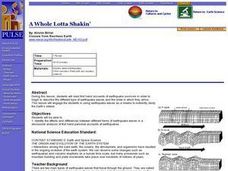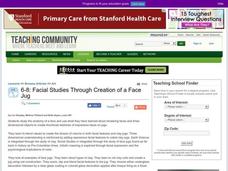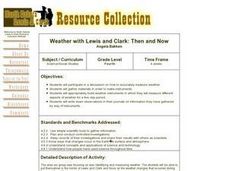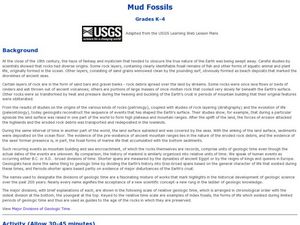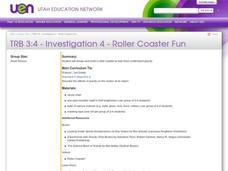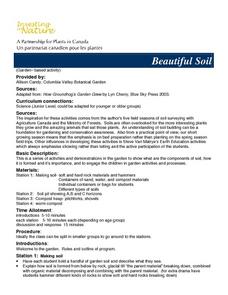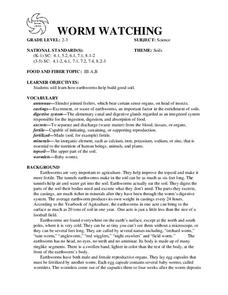Curated OER
The Envelope System: A Partial Solution
Studnet identify examples of conduction, convection and radiation. They develop an example of a building envelope. They also describe how heat transfer mechanisms can affect home energy costs.
Curated OER
The Sun and Moon
Learners understand basic concepts about Earth, the Sun and the Moon,
such as relative movement and the phases of the moon. Through discussion, looking at pictures, listening to Native American stories, observing, and building models,...
Curated OER
A Whole Lotta Shakin'
Students read first hand accounts of earthquake survivors in order to begin the describe the different types of earthquake waves and the order in which they arrive. They engage in using earthquake waves as a means to indirectly study the...
Curated OER
Birds on the Move
Students observe the migrational path of the Swainson's Hawk from northern Minnesota to the southern portion of South America. They study the migratory path of the hawk and observe how the vegetation in a particular region of the earth...
Curated OER
Earthquakes
Learners inspect the causes and effects of earthquakes and examine how seismic waves travel. In this earthquake lesson, students determine where earthquakes happen and why, before determining how to build an earthquake resistant...
Curated OER
Earthquake Proof Structures
Eighth graders build a structure that is able to withstand a simulated earthquake. They research earthquakes, earthquake measurement, and society's preparation for and reaction to them. Pupils build models and present them to the...
Curated OER
Water Cycle Terrariums
Young scholars explore the water cycle. They build a model of the water cycle in the form of a terrarium and explain how it demonstrates the water cycle. In addition, they draw a representation of the water cycle demonstrated in the...
Curated OER
Let the Sun Shine!
Students investigate how the sun can be used for energy. They read a handout, discuss the pros and cons of passive solar building design, develop flashcard questions, and identify jobs that can be helped by solar energy.
Curated OER
Stream Table
Students build and erode a hillside. For this earth science lesson, students build a five inch hillside in a paint pan using sand, soil, and pebbles. They pour water over the hillside to monitor the erosion and how it is affected by the...
Curated OER
Facial Studies Through Creation of a Face Jug
Students study facial expressions and create a face jug. In this facial study lesson, students look at images of face jugs through history before drawing thumbnails of facial images. They use the coil method to make a jug, and use a...
Curated OER
Blast Off with Model Rockets
Students investigate science and math by building a rocket. In this geometry lesson, students build a rocket using paper towel tubes while investigating questions about launching a rocket. They discuss balance and unique structure as...
Curated OER
The Planet Mars
Fifth graders gain knowledge about Mars and Earth. In this compare and contrast lesson, 5th graders use visual representations of the solar system to observe the characteristics of the planets. Students read fiction and nonfiction...
Curated OER
TRB 5:2 - Activity 3: Earthquakes
Learners watch a classroom demonstration, and experiment to discover the five ways that Earth's crust shifts along a fault.
Curated OER
Redefining an Earthquake
Ninth graders build an "Earthquake Machine" (a manipulative model of a fault line) and use it to explore stick-slip behavior of some faults and to develop a more accurate definition of an earthquake and its causes.
Curated OER
Changing Crust
In this changing crust worksheet, learners use candy bars, licorice sticks and bubble gum to simulate the 3 types of forces that change the Earth's crust. These include compressional forces, tensional forces and transversal forces. The...
Curated OER
Weather with Lewis and Clark: Then and Now
Fourth graders discuss how to accurately measure weather, gather materials in order to make instruments, and build weather instruments in which they measure and record different aspects of weather for a five-day period.
Curated OER
Mud Fossils
Students observe real fossils. In this science lesson, students make their own mud fossils by pressing material into the mud and letting it dry in the sun for 3-4 days. Students then get the fossils out displaying their mud fossils.
Curated OER
Roller Coaster Fun
Third graders review the effects of gravity on how objects move. In groups, they design a roller coaster and share it with their classmates. Using materials given to them, they build their roller coaster and let a ball roll on the...
Curated OER
Coal Derivatives
Students use this hands-on activity to demonstrate the production of coke, one of the most widely used raw materials derived from coal. They are also stimulated to do research into the differences in coal types and coal products.
Curated OER
Beautiful Soil
Students discover what are the components of soil. They examine how it is formed and it's importance. They engage in garden activities and processes. They hold a handful of garden soil and describe what they see. They take a...
Curated OER
FINDING A RESOLUTION
Young scholars examine detailed Moon and Earth views provided by the NASA-sponsored "World Wind" computer program. They work in groups to create maps of different scales using landmarks of their choice, and challenge their classmates to...
Curated OER
WORM WATCHING
Young scholars investigate how earthworms help build good soil. They examine the worms carefully to find the ringlike segments and swollen band at the front of the earthworm's body. Students take turns dampening the soil every day and...
Curated OER
How Do We Explore Strange Environments?
Students identify and label the different parts of a robot, rover, or a spacecraft. They discuss and record all of the features their robot will need to accomplish its mission and be able to explain why they chose these features to...
Curated OER
Water Table Lab
Students build a water table to show the zones of aeration and the zones of saturation. In this water table lesson plan, students use a beaker with sand and gravel to simulate the Earth's water table. They label the zones of aeration and...




